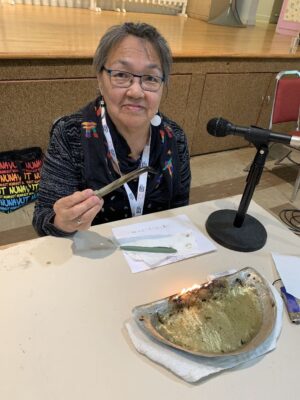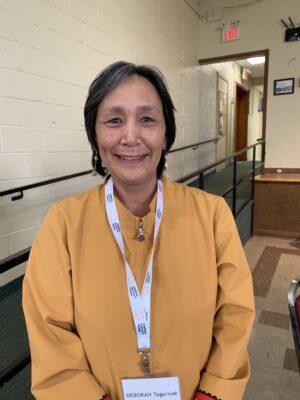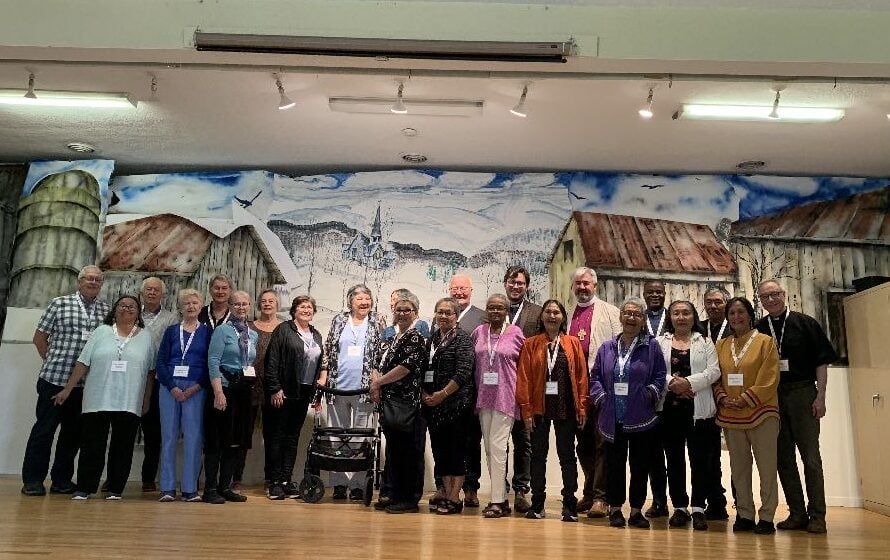Bishop Shane Parker brought parishioners from several parishes together in mid-June at St. Stephen’s Church in Ottawa to talk about ways that Anglicans across the diocese could help to better serve the large and growing community of Inuit living in the city.
The Rev. Canon Aigah Attagutsiak, who grew up in Arctic Bay (Ikpiarjuk), is associate incumbent in the parish of St. Margaret’s Vanier, which has a Inuit congregation as well as a non-Inuit congregation. She conducts services, offers sermons and pastoral care in Inuktitut in the parish and beyond. Aided by simultaneous translation in Inuktitut, much of the discussion centred on how much the need for care and services there is in the Inuit community beyond the parish, needs that far exceed what one priest and current volunteers can provide, and how Anglicans in the rest of the diocese may learn from Inuit how to act in solidarity with them for the changes they want to see.
There are thousands of Inuit living in Ottawa and the surrounding region. They travel or move to the South for a variety of reasons — to access specialized health care not available in the North and sometimes to accompany a family member in Ottawa for medical treatment, for educational and job opportunities, better housing and a lower cost of living. Some are only here temporarily, others move to the city permanently.

Whatever brings them to the city, Canon Aigah said it is common for those arriving to feel lost in a big city and culture very different from their own. They may be unaware of services and Inuit organizations that can help them navigate this new experience.
Bishop Shane noted in his remarks that because of the Anglican Church’s historical relationship to the Inuit in the North, many Inuit may look to the church for pastoral care, community, and support in Ottawa. Canon Aigah said that St. Margaret’s Inuit congregation can be a source of comfort and cultural connection.
“It’s so wonderful to be hearing the sermons in Inuktitut,” St. Margaret’s parishioner Jukeepa Hainnu said. She is an instructor at Nunavut Sivuniksavut, a two-year post-secondary program of Inuit Studies in Ottawa that will serve a cohort of about 70 students coming from all over Nunavut in the coming year. Hainnu explained that there is a huge rate of language loss. Among the youth that come to Ottawa, she said only about five percent speak Inuktitut. “And it’s very important that we have an Inuktitut church to support our language… because it is our grounding in who we are. And I think a lot of the youth lose their grounded image of themselves, and they have more problems because they don’t really know who they are.”
She added that at Nunavut Sivuniksavut, “We teach the history of Inuktitut, Inuit culture, and we see a big change in their attitude and way of understanding.”
The Rev. Colin McFarland, incumbent priest at St. Margaret’s, explained that the church is part of an ecosystem of Inuit organizations in the city, and anything that benefits St. Margaret’s Inuit congregation benefits the whole ecosystem and vice versa.
Canon Aigah is a key figure in the Inuit community. She is often called upon to visit Inuit in hospital or to conduct funerals. On the day of the consultation, she had only had a few hours of sleep because just as she arrived home from a visit to the North, she received a phone call to go to an Inuk person in hospital. This is especially challenging because she doesn’t drive and relies on others to help her get to all the people and places she is asked to go to, she said.
Deborah Tagurnaaq, who is Inuit advisor to the bishop, works closely with Canon Aigah and expressed concern about the high level of demand for her time and pastoral care. As someone with an extensive history of work in the Inuit community and in reconciliation work, Deborah spoke about how hard hit the Inuit community has been by the pandemic and opioid crisis in addition to other struggles such as addiction and violence. Inuit people go missing at an alarming rate, she said. She was relieved to receive a text from Ottawa police that morning notifying her that one of the three people they were currently searching for had been found safe. Deborah has become the person Inuit people call on for help when they have lost a loved one in Ottawa and she explained that she has helped repatriate the bodies of 22 people who have died in Ottawa to their families in the North – an long, labour intensive process that can take weeks.

This is one of the many areas where support is needed, Deborah said. “I cannot do it alone. Aigah cannot do it alone. We need search and rescue. We need a one-stop place where Inuit from the Arctic can look for information and keep contact with the family members.”
Dr. Vera Etches, medical officer for Ottawa Public Health, is also a St. Margaret’s parishioner and participated in the consultation. She observed that there is great strength and leadership in the Inuit-led organizations in Ottawa. “I think as the church is looking for direction it is important to listen to people here but also to listen to what these organizations are saying.” And affirming the dire situation Deborah spoke of, she said, “It is very important to hear about the mortality. It’s the worst possible outcome and it’s disproportionate and very real. Community members have ideas for solutions, but these organizations don’t have everything they need to implement solutions. I think that definitely includes housing, It definitely includes land to build housing, and it definitely includes spiritual care.”
Attempting to serve the large Inuit community in the city keeps St. Margaret’s parishioners busy too. Bernie Delmaire explained that St. Margaret’s has made attempts to offer spiritual care to Inuit people who are staying at Larga Baffin while in Ottawa for medical treatments. He and his wife Dora used to help with worship services there that were once held weekly and then reduced to monthly and ended during the pandemic. “There are 200 or more clients there at one time, and there is a real spiritual need that could be addressed if we could get on track to do regular visits there, but we most probably need support to get that going again.”
Delmaire added that they also tried providing transportation from Larga Baffin to St. Margaret’s, but the cost and distance from St. Margaret’s proved to be too much for the parish. “There are, however, some volunteers from St. Margaret’s that continue to pick up people from Larga Baffin to come to our church for Sunday services. It is really beautiful to have them there,” he said. “There is a very similar need at Embassy West [which provides long-term care for Inuit seniors] as well. We never could provide the service to them as we did at Larga Baffin, but there is a real need there as well, as there is usually around 75, 80 elders there that would gladly receive services from the church.”
As the time for the consultation drew to a close, McFarland reassured all who attended from St. Margaret’s, St. Stephen’s and St. Thomas the Apostle parishes as well as the All My Relations Circle that the expectation for the consultation was not to find immediate solutions but to begin to listen and learn. “It’s a humble, modest beginning. And this doesn’t need to be the end, but it can be a beginning of getting to know one another better,” he said.
Bishop Shane added, “As we have benefited from translation this morning, we need to continue to ensure that we can hear and understand one another from the language of our hearts, speak in our own way and be heard and understood. We’re not going to nail down solutions this morning. That’s too much for us to take. But we have heard need. We have heard of goodness that is happening. We’ve heard challenges. And I think God the Holy Spirit will continue to help us to hear in our own ways as individuals and parish communities that are here, and certainly in terms of our diocesan church.”







Saint Mary’s Church, Westmeath — Deanery of the Northwest